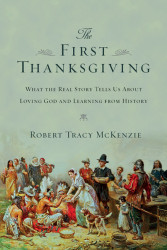
McKenzie, Robert Tracy. The First Thanksgiving: What the Real Story Tells Us About Loving God and Learning from History. Downers Grove, IL: IVP Academic, 2013.
Review by Joshua Shiver
“Ours is a present-tense society,” historian Robert Tracy McKenzie notes, “We live in a time and place in which thinking deeply about the past is a countercultural and even a radical act.” Twenty-four hour news channels, instant status updates, and communication with the click of a mouse or tap of a finger have made ours a world of the here-and-now. This myopic focus on the present has blinded us to the importance of our past—even as modern Americans grope for answers to societal woes in a post 9/11 world. As a graduate student, the question I am most often asked now is what I intend to do with a degree in history. I’ve realized that behind this less-than-subtle jab at my life choices, friends and acquaintances are really asking me “What’s the point?”
In The First Thanksgiving: What the Real Story Tells Us About Loving God and Learning from History, historian Robert Tracy McKenzie seeks to answer this question by cutting through the misty legends surrounding the story of the first Thanksgiving. In the process of uncovering the truth, McKenzie emphasizes the methods and philosophy used by historians both to evaluate and understand the past. Carefully balancing narrative with analysis, The First Thanksgiving attempts to help believers to think “Christianly and historically—about the American past.” The story that the author uncovers is far more complex than the simple interaction between Native Americans and the English, as has often been portrayed. Rather, this is a story of American identity and historical memory. Within the story of Thanksgiving we find “the strands of national identity, religious heritage and historical memory, all inextricably interwoven.” It is also a story that invites moral reflection wherein “the past can be part of a life-changing dialogue with the ages, in which we confront enduring questions and seek a heart of wisdom.”
The book’s organization takes the reader chapter-by-chapter through analysis of the fact or fiction surrounding the first Thanksgiving while also framing key concepts or principles to sound historical thinking. Chapter one looks at the all too important role of evidence in historical understanding. Chapters two through six examine the importance of historical context, the role of history in education, the danger of historical idols, and the metamorphosis of historical memory into historical fiction while also reconstructing the Pilgrim’s story from their nascent beginnings in England through their first painful years in the Americas. Chapter seven looks at the malleability of popular memory (how we remember the past) by examining the ways in which Americans have reinterpreted the events of the first Thanksgiving over time for their own present purposes. Finally, in Chapter eight, McKenzie makes a convincing case for history as a tool of moral reflection and understanding the larger meaning behind our study of the past.
The story of the first Thanksgiving acts as microcosm for understanding the importance of thinking correctly about the past. Well-written and thoroughly engaging, The First Thanksgiving is one of the most thought-provoking books that I have ever read on the meaning and importance of history. History is a profoundly human story (of “image bearers just like us”) and McKenzie offers a toolbox for tapping into the cosmic chain that binds all of us across time and space. It is also a clarion call for the church to lay down its “history as a weapon” approach to the so-called “culture wars.” As the author demonstrates, history is much more than a weapon of war. It is a lamp that illuminates the path to our present as well as the road to our future. “If God is the author and Lord of history—if the past is a sphere of human experience that He has sovereignly ordained—how can we study history without openness to life-changing insight?,” he writes; “Our historical pursuits should seek meaning as well as understanding, wisdom, as well as knowledge. They should center on two pivotal questions: What can I learn about the past? and What can I learn about how to live?” The answers to those questions will shape not only our present but well-nigh our future.
Reflection Questions:
- How has your own personal past shaped your present? What do you think are the implications on a larger scale?
- What are some of the dangers of focusing so intently on the present? Do you believe that this myopic focus on the present has led to some of the issues that plague our society?
- How can history help human beings know God? What are some examples in your own life?
Josh Shiver is a graduate student in American history at Auburn University. He has a B.A. in history from the University of North Carolina at Greensboro and an M.A. in history from the University of North Carolina at Wilmington. Josh’s research interests include the American Civil War, the American Revolution, and the Korean War. His current research looks at the role of relationships on soldier motivations during the Civil War.

Leave a Reply